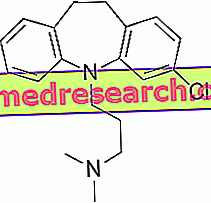Potassium functions

In a "standard" diet, the daily intake of potassium amounts to 4 g and is largely higher than the required requirement.
Potassium in food
Potassium is found in numerous foods such as beans and dried peas, asparagus, potatoes, apricots, bananas, cauliflower, spinach.
CONTENT IN POTASSIUM IN FOODS | ||
| HIGH | MEDIUM | BASS |
| Dried apricots | spinach | Parmigiano |
| Dried vegetables | Tuna in oil | wheat flour |
| Dates | walnuts | Pere |
| almonds | Artichokes | corn flour |
| peanuts | Bananas | apples |
| Mackerel | Emmenthal | |
| chestnuts | White bread | |
To know more
Potassium in food and potassium requirements
Potassium rich diet
Potassium metabolism
Absorption occurs passively in the duodenum and in the jejunum (intestine), while elimination occurs through the urine. Large quantities of potassium can be eliminated through the kidneys without risking intoxication, as in vegetarians. On the contrary, in the event of a deficient contribution, there is no locking mechanism for its elimination, therefore the same quantity is always eliminated (mandatory elimination).
To know more:
Potassium metabolism
Shortage and excess
A potassium deficiency can be established in particular pathological states, following a prolonged administration of parenteral-free potassium solutions, in the case of adrenal hyperfunction or excessive intake of diuretics. The symptoms are: muscle weakness, hyperexcitability, arrhythmias and electrocardiographic changes until reaching the heart block and death.An excess of potassium due to renal failure, dehydration, insufficient adrenal secretion, causes asthenia, muscle cramps, hypotension, bradycardia and cardiac arrest.
To know more:
Potassium deficiency and potassium supplements
Supplements - potassium chloride
Supplements - potassium citrate
Mineral salt supplements
Potassium and sport
The predominantly anaerobic physical exercise is accompanied by a leakage of potassium from muscle tissue; this phenomenon, together with the haemoconcentration and the possible release of potassium by the erythrocytes, determines an increase in the concentration and total plasma content of potassium, even if of short duration, whose entity is correlated with the intensity of the muscular work.
Hypopotassemia, can be observed following prolonged and / or repeated exercises especially following sweat losses but also for lack of effective saving mechanisms; if not properly treated, it can be less severe until renal failure.
To know more:
Sodium and potassium, loading unloaded in preparation for a book
Potassium and body composition
The potassium content in the various body tissues is relatively constant; in the lean alipidic mass it is contained in a measure of 2.5 g / kg, while the reserve triglycerides are totally free of it. This premise lays the foundations for the evaluation of body composition by dosing potassium in the body.
The instruments used for this purpose exploit the natural presence in the body of a radioactive isotope, potassium forty (K40), which is always present in defined proportions with respect to total body potassium. Because of this radioactivity, potassium 40 continuously emits gamma signals, which can be picked up by appropriate and elaborate machinery to obtain an estimate of lean body mass; by difference, it will be possible to calculate the lipid one.
It is undoubtedly an extremely precise method; the exam lasts about fifteen minutes, is not dangerous to health, but the prohibitive costs of the equipment make it impractical to use on a large scale.



